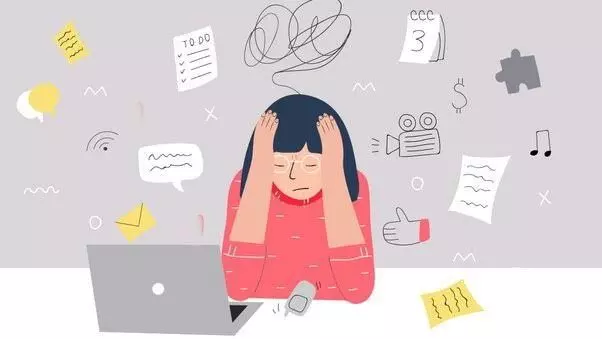Study shows stress can worsen cognitive impairment
Right from childhood, parents should encourage their children to cope with stress, rather than criticise them for failures
By Sulogna Mehta
Hyderabad: Are you in your mid-40s and already starting to forget information and having problems focusing and learning new things? Blame it on chronic stress.
Study links stress to cognitive impairment
According to a study published in the journal JAMA Network Open, high levels of stress among people aged 45 or older can raise their risk of developing cognitive impairment. Cognitive impairment is described by the US Centre for Disease Control and Prevention as the inability to recall information, learn new information, focus, or make judgments that have an impact on daily activities.
In the study, 24,448 people were enrolled, and the researchers used standardised testing to determine the cognitive status of each participant, such as stress levels, etc. The findings of the study showed that 23% of the participants reported higher stress levels, which involved feelings or situations beyond their ability to cope.
It also showed that the rate of cognitive decline was greater among the most stressed participants, regardless of age, race or sex. It is well known that cognitive impairment is a key feature of Alzheimer’s disease and other types of dementias.
Stress causes several physical and mental ailments
Additionally, several studies have shown that daily or chronic stress is linked with various physical and psychological problems and underlying health conditions, such as anxiety, depression, digestive issues, headaches, heart disease, high blood pressure, sleep problems and so on.
Stress can alter brain structure and function
Explaining the correlation between chronic stress and cognitive function, senior neurosurgeon from Pinnacle Hospital, Vizag, Dr. P.V. Ramana elaborates, “Due to stress, the body releases cortisol and adrenaline hormones that induce physiological changes in the brain. Chronic stress has been linked to decrease in volume of grey matter in certain areas of the brain such as the hippocampus, frontal cortex, and amygdala. These regions are involved in memory, learning, and emotion regulation. Studies have shown that chronic stress can alter the connectivity between different regions of the brain, which ultimately affects cognitive and emotional processing. It can also impact the brain’s ability to adapt and change over time.”
Dr. Ramana added, “Chronic stress has been linked to reduced neuroplasticity, which can ultimately impact learning and memory. Stress can also trigger inflammatory responses in the brain, which leads to damaged brain cells and impaired cognitive function and learning ability. Chronic stress also affects the balance of neurotransmitters like serotonin, dopamine and norephedrine, which ultimately impacts the mood, behaviour, emotion, motivation and also cognitive function.”
Pointers
Chronic stress can cause these ailments:
Physical: Headache, hairfall, skin diseases, skin aging, indigestion and several gastrointestinal disorders, aggravate existing sinusitis, cold, cough, allergies, high blood pressure and high cholesterol, indirectly lead to diabetes and obesity, infertility and low libido, cardiac ailments and heart attacks, musculo-skeletal problems such as back pain, neck pain, fatigue, body pain, arthritis. It also affects the lungs and precipitates the symptoms of asthma, breathing difficulties, etc, say doctors.
Psychological: Stress can induce physiological changes in the brain thereby affecting memory, cognition, learning and emotion regulation, lack of proper sleep, reduces neuroplasticity, which can ultimately impact learning and memory. Chronic stress also affects the balance of neurotransmitters like serotonin, dopamine and norephedrine, which ultimately impacts the mood, behaviour, emotion, motivation and also cognitive function.
Learn to minimise stress
· Right from childhood, parents should encourage their children to cope with stress, rather than criticise them for failures.
· Identify the various physical and psychological triggers and symptoms of stress, which require counseling or/and medication.
· Opt for lifestyle changes by choosing a healthy diet, rest and sleep pattern and do meditation and exercise regularly.
· Spend more time with family, children, pets and loved ones rather than on virtual media.
· Pursue a hobby like some sports, music, painting or any arts and activities that one likes.
· Go for digital detox once in a while and spend time hiking, bird-watching, trekking in nature.